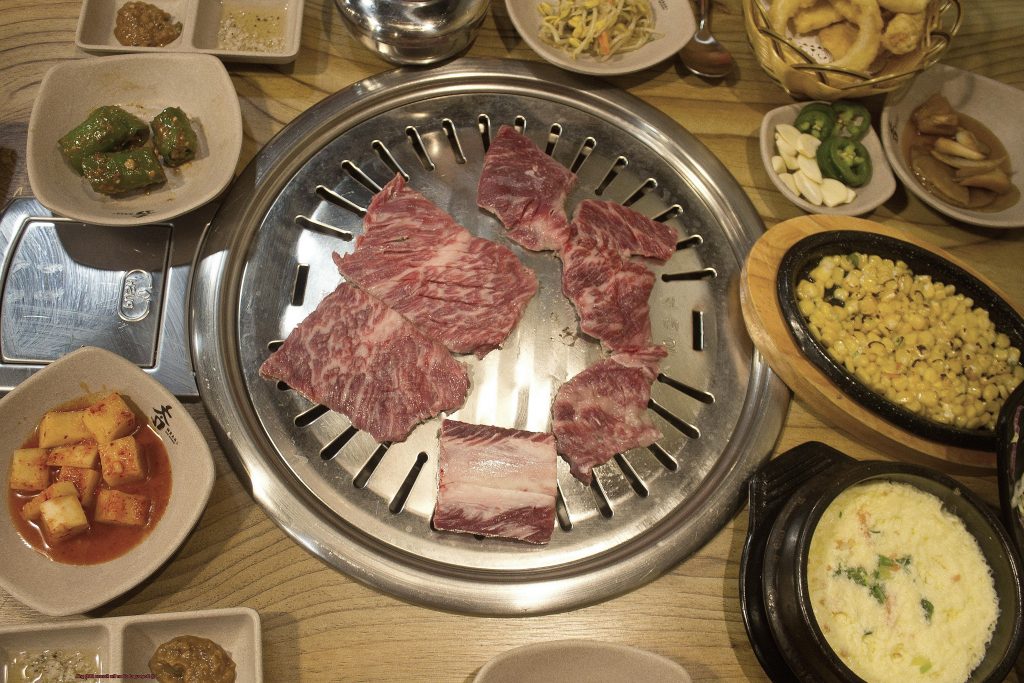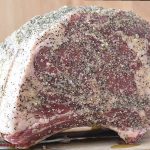Are you a die-hard Korean BBQ fan? Do you have an upcoming BBQ night and want to ensure your grill is perfectly prepared? One of the most common questions that come up is whether or not to put oil on the Korean BBQ grill.
For those new to Korean-style grills, this can be a puzzling question. While oil is a staple ingredient in many BBQ recipes, its use on a Korean BBQ grill can be confusing. Some grills come with a non-stick coating, which eliminates the need for oil. However, others require it to prevent meat from sticking to the grill and maintain its natural flavor.
In this post, we’ll guide you through everything you need to know about using oil on your Korean BBQ grill. We’ll cover the types of oils that work best and how to apply them correctly for maximum results. Additionally, we’ll highlight crucial tips to help you keep your grill in top shape so it lasts for years to come.
So get ready to fire up your grill and discover whether or not you should use oil on your Korean BBQ grill. After reading this post, you won’t want to prepare another Korean BBQ without these essential tips and tricks.
Contents
What is Korean BBQ?
It’s a cooking method that involves grilling various types of meat on a tabletop grill, often enjoyed with family and friends as a social activity.
At the heart of Korean BBQ is the communal experience of dining together. This is why it’s not just about cooking and eating the meat but also about sharing stories and making memories over delicious food. It’s no surprise that this tradition has become an integral part of Korean culture.
Bulgogi, which means “fire meat” in Korean, is the most famous Korean BBQ dish. It’s thinly sliced beef that has been marinated in a sweet and savory sauce made from soy sauce, garlic, sugar, and other spices before being grilled to perfection. Another favorite dish is Galbi, which consists of marinated beef short ribs. These dishes are often served with rice, lettuce leaves, and an array of side dishes called banchan.
To achieve the best results when grilling Korean BBQ, it’s important to lubricate the grill to prevent the meat from sticking. Some people use oil like vegetable oil or canola oil with high smoke points, while others opt for flavorful marinades that add an extra kick to the meat.
Korean BBQ has evolved to include non-meat options such as tofu and vegetables for vegetarians and vegans. These options are just as flavorful and satisfying as their meat counterparts.
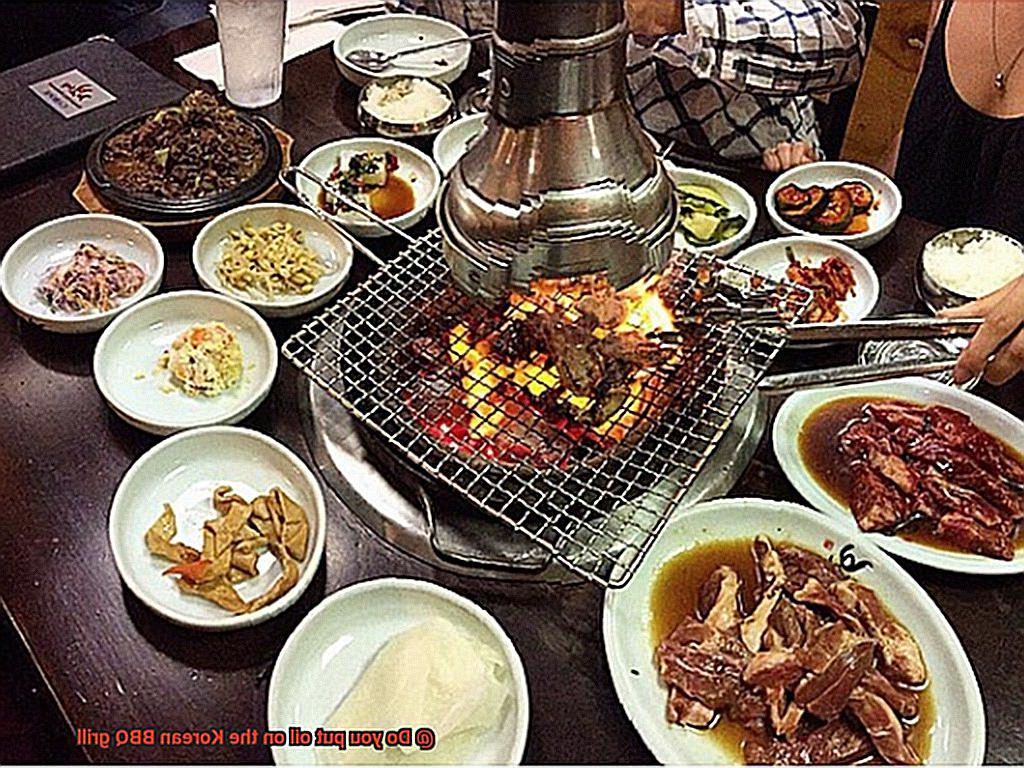
Reasons to Put Oil on the Grill
If you’re a fan of Korean BBQ, you know that grilling meat to perfection is an art form. To ensure your meat is cooked evenly and has that classic smoky flavor, it’s essential to oil your grill. Here are six reasons why putting oil on your Korean BBQ grill is a must:
Prevents sticking
When you oil your grill, it creates a non-stick surface that prevents meat from tearing or breaking apart while cooking. This is especially important for lean cuts of meat or fish, which tend to stick to the grill. By applying oil, you can turn and flip your meat with ease, ensuring it cooks evenly.
Promotes even cooking
Oiling your grill helps to distribute heat evenly across the surface, ensuring that your meat cooks thoroughly throughout. This is because the thin layer of oil acts as a barrier between the meat and the hot metal surface.
Enhances flavor
One of the best ways to enhance the flavor of your Korean BBQ is by adding oil to the grill. The heat from the grill causes fat in the meat to melt and drip down onto the coals, creating smoke that infuses the meat with a rich smoky flavor. By adding oil to the grill, you provide extra fat for the meat to soak up, amplifying this delicious flavor.
Creates classic grill marks
One of the hallmarks of great Korean BBQ is those beautiful charred lines on the surface of the meat. These grill marks not only look visually appealing but also indicate perfectly cooked meat. By applying oil to your grill, you can ensure that these marks are evenly distributed and not too deep or too light.
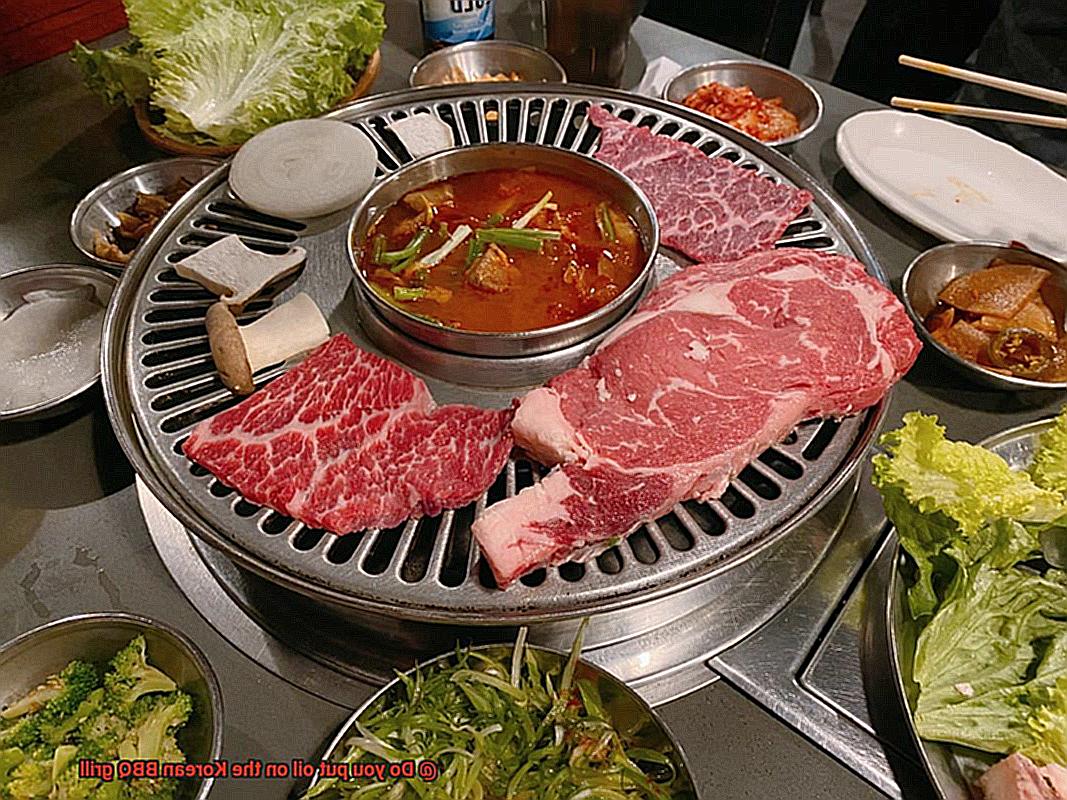
Keeps meat moist and tender
When meat is cooked on a dry surface, it can become tough and dry, leading to an unappetizing final product. Oiling your grill helps to lock in moisture, keeping your meat juicy and flavorful.
Reduces flare-ups and smoke
When fat drips onto a hot grill, it can cause dangerous flare-ups and create unpleasant smoke. By coating your grill with oil beforehand, you can reduce these risks and create a safer and more enjoyable grilling experience.
Different Types of Oils for Korean BBQ Grilling
When it comes to Korean BBQ grilling, getting the right type of oil can make all the difference in the world. Certain oils can enhance the taste of your grilled meats and vegetables, while others can prevent them from sticking to the grill. Here are the five most commonly used oils for Korean BBQ grilling and their unique flavor profiles:
Sesame Oil
This aromatic oil is made from toasted sesame seeds and has a rich nutty flavor that pairs well with grilled meats. Sesame oil has a low smoke point, so it’s best used as a finishing oil after the meat has been cooked. A little goes a long way.
Vegetable Oil
Vegetable oil is a go-to neutral-flavored oil that is commonly used for cooking and grilling. It has a high smoke point, which makes it ideal for high-heat cooking methods like grilling. Plus, it’s readily available at most supermarkets.
Grapeseed Oil
Grapeseed oil is another neutral-flavored oil that has a high smoke point. It’s often used as a substitute for vegetable oil and can be an excellent option for those with allergies or sensitivities to other types of oils.
Avocado Oil
For those who prefer a healthier option, avocado oil is an excellent choice for Korean BBQ grilling. It has a mild, buttery flavor and a high smoke point, making it perfect for grilling at high temperatures. Avocado oil is also rich in monounsaturated fats that promote heart health.
Coconut Oil
Coconut oil has a distinctive tropical flavor that can add an interesting twist to Korean BBQ dishes. It has a relatively low smoke point, so it’s best used for lower-heat grilling methods. Coconut oil can be an excellent choice for those who want to experiment with new flavors.
Ultimately, picking the right type of oil depends on your personal preferences and the type of meat you are grilling. If you’re looking for a nutty flavor, sesame oil might be the way to go. If you prefer a mild taste, vegetable oil or grapeseed oil could be your best bet. On the other hand, if you want to add a tropical twist, coconut oil might be the perfect choice. Experimenting with different oils can help you find the perfect flavor combination for your Korean BBQ dishes.
Benefits of Using Oil on the Grill
Then let me show you the incredible benefits of using oil on the grill. As an expert in this field, I can confidently say that a little bit of oil can go a long way in creating mouth-watering, perfectly cooked dishes that are packed with flavor. Let’s explore why:
- Prevents sticking: The first and most obvious benefit of using oil on the grill is that it prevents your food from sticking to the grates. This is especially important for Korean BBQ, which often involves thinly sliced meats and vegetables that can easily get stuck. By applying a thin layer of oil, you’ll be able to flip and remove your food without any pesky bits left behind.
- Adds flavor: But the benefits of using oil don’t stop there. When heated up, the oil can create a delicious smoky flavor that infuses into your food, giving it a charred taste that’s hard to resist. And if you want to take things up a notch, you can experiment with different oils and add herbs or spices to further enhance the flavor profile of your dishes.
- Keeps your grill clean: Another great benefit of using oil is that it helps keep your grill grates clean. When you apply oil before cooking, it creates a barrier that prevents food from sticking and burning onto the grates. This means that cleaning your grill becomes much easier since there will be less residue left behind.
- Regulates temperature: And last but not least, using oil can help regulate the temperature of your grill. When you apply oil to the grates, it helps distribute heat evenly across the surface, ensuring that your food cooks more consistently and thoroughly. Say goodbye to undercooked or overcooked dishes.
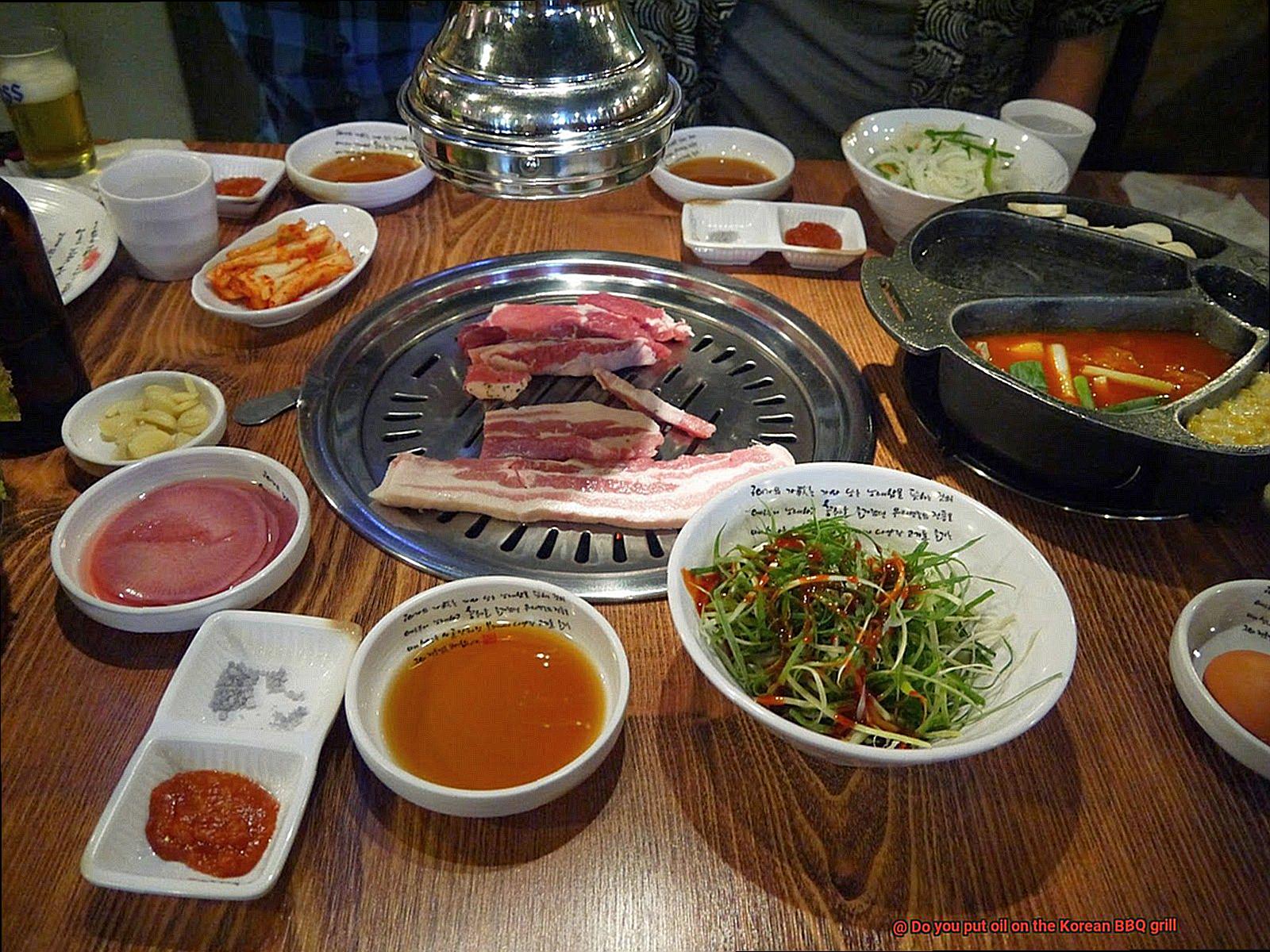
Alternatives to Oil for Korean BBQ Grilling
However, if you’re looking to cut down on calories or simply explore different options, there are plenty of alternatives to oil that can still give you that delicious taste and prevent sticking.
One alternative that’s gaining popularity is using a non-stick cooking spray. Canola or vegetable oil sprays are great options as they provide similar benefits as oil but with less fat and fewer calories. Just be mindful of how much you use as some sprays can contain additives and chemicals.
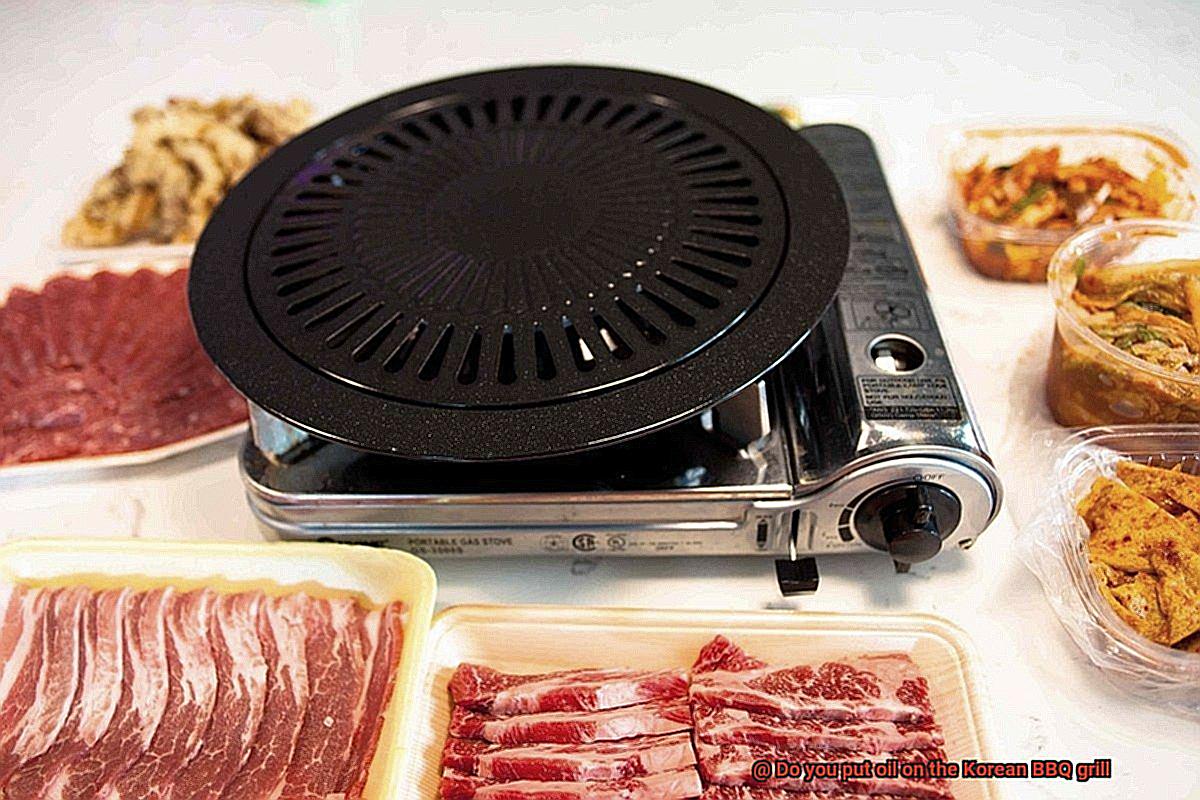
Another option is marinating your meat before grilling. Not only does this add flavor but it also creates a natural barrier between the meat and grill, reducing the need for oil. Some popular marinades include soy sauce, garlic, ginger, and sesame oil. Experiment with different combinations to find your perfect flavor profile.
For a tangy twist, consider rubbing citrus fruits like lemon or lime on the grill before cooking. The acidity helps prevent sticking while adding a zesty flavor to your meat.
If you’re looking for a more hands-off approach, try using a grate or mesh basket instead of grilling directly on the surface. This allows for better air circulation and prevents sticking without needing any oil at all. Plus, it makes cleanup a breeze.
Tips for Properly Lubricating the Grill
Korean BBQ is a mouth-watering dish that requires proper grilling to achieve the perfect flavor and texture. To ensure that your Korean BBQ comes out perfectly every time, it’s essential to know how to properly lubricate the grill. Here are five sub-sections to help guide you through the process.
Choose the Right Type of Oil
The type of oil you use on your Korean BBQ grill can significantly affect the flavor and texture of your food. High-smoke point oils like canola, vegetable, or grapeseed oil are recommended as they won’t burn easily and will create a non-stick surface on the grill. These oils are also healthier options than others with lower smoke points like olive oil or butter.
Clean the Grill
Before applying any oil, make sure your grill is clean and free of any debris or food particles from previous grilling sessions. Use a wire brush or scraper to remove any excess food or grease from the grates.
Apply a Thin Layer of Oil
Once your grill is clean, it’s time to apply a thin layer of oil to the grates. Use a paper towel or brush to apply the oil evenly across the grates. Be careful not to use too much oil, as this can cause flare-ups and smoke.
Lubricate Before Each Use
To prevent food from sticking and make cleanup easier, lubricate your grill before each use. Some experts also recommend lubricating the grill after each use to prevent rust and corrosion.
Monitor the Temperature
It’s important to monitor the temperature of your grill when lubricating it with oil. If the grill is too hot, you may experience flare-ups or smoke, which can affect the flavor of your food. Wait until the grill has cooled slightly before applying oil.
How to Marinate Meat for Korean BBQ Grilling
Korean BBQ grilling is all about flavor, and marinating the meat is a crucial step in achieving that. Here’s a more detailed guide on how to marinate meat for Korean BBQ grilling:
Choose the Right Cut of Meat
Choosing the right cut of meat is essential for Korean BBQ grilling. Thinly sliced cuts of beef like ribeye or sirloin are perfect for quick grilling and absorb marinade flavors well.
Prepare the Marinade
The marinade sauce is the heart of any Korean BBQ dish. A typical marinade includes soy sauce, sugar, garlic, onion, sesame oil, ginger, and other spices. You can either make your own marinade or buy pre-made marinade sauce from an Asian grocery store. Mix all the ingredients together until well-combined.
Marinating the Meat
Marinating meat helps to tenderize it and infuse it with flavor. Place the meat in a large resealable plastic bag with the marinade sauce and massage it to ensure that the meat is coated evenly.
Then, refrigerate the bag for at least 30 minutes or up to 24 hours, depending on the cut of meat. Thinner slices of beef only need to be marinated for 30 minutes, while thicker cuts like short ribs can be marinated for up to 24 hours.
Let the Meat Reach Room Temperature
Before grilling the marinated meat, remove it from the refrigerator and let it sit at room temperature for 30 minutes. This will help the meat cook evenly and prevent it from becoming tough.
Preheat the Grill
Preheating the grill is important to achieve a nice sear on the meat and avoid overcooking it. Heat the grill to medium-high heat before placing the meat on it.
Lightly Brush Some Oil on the Grill
It is important not to put too much oil on the grill as the marinade sauce already contains oil. However, lightly brushing some oil on the grill can prevent sticking and ensure even cooking.
Grill the Meat to Perfection
Now that your meat is marinated and your grill is preheated, it’s time to grill. Place the meat on the grill and cook until desired doneness is reached. Thinly sliced beef only needs a few minutes per side, while thicker cuts like short ribs may take longer.
Pros and Cons of Putting Oil on the Grill
Grilling is an art form, and every cook has their own set of techniques and tricks to achieve culinary perfection. So, let’s take a closer look at the pros and cons of using oil on your Korean BBQ grill.
Firstly, let’s discuss the benefits of using oil. One of the most significant advantages is that it helps prevent food from sticking to the grill grates. Especially when cooking delicate foods like fish or vegetables, a quick brush with oil creates a barrier between the food and the grill that makes flipping easier and prevents it from falling apart. Additionally, oil can help create a beautifully crispy exterior on meats like chicken or steak.
However, there are some downsides to using oil on the grill. One of the biggest concerns is that it can cause flare-ups, which can be dangerous. When oil drips onto the flames, it can cause a sudden burst of fire that can be difficult to control. This is especially true for fatty meats like burgers or sausages that have a lot of grease.
Moreover, another potential downside to using oil on your Korean BBQ grill is that it can create smoke and an unpleasant odor. This can be particularly problematic if you are grilling indoors or in an enclosed space. The smoke can also affect the flavor of your food, potentially making it taste burnt or bitter.
So, what’s the verdict? Ultimately, whether or not to use oil on your Korean BBQ grill comes down to personal preference and the type of food you are grilling. To make it easier for you, we have compiled a list of pros and cons:
Pros:
- Prevents delicate food from sticking
- Creates a crispy exterior on meat
Cons:
- Can cause dangerous flare-ups, especially with fatty meat
- Creates smoke and an unpleasant odor that can affect the taste of food
yyB3bhKiffM” >
Conclusion
In conclusion, the answer to whether or not you should put oil on a Korean BBQ grill is not a straightforward one.
It ultimately depends on your personal preference and the type of meat or vegetables you are grilling. However, if you do decide to use oil, make sure to choose an oil with a high smoke point to avoid any unwanted flavors or smoke.
Ultimately, experiment with different methods and find what works best for you and your taste buds.

